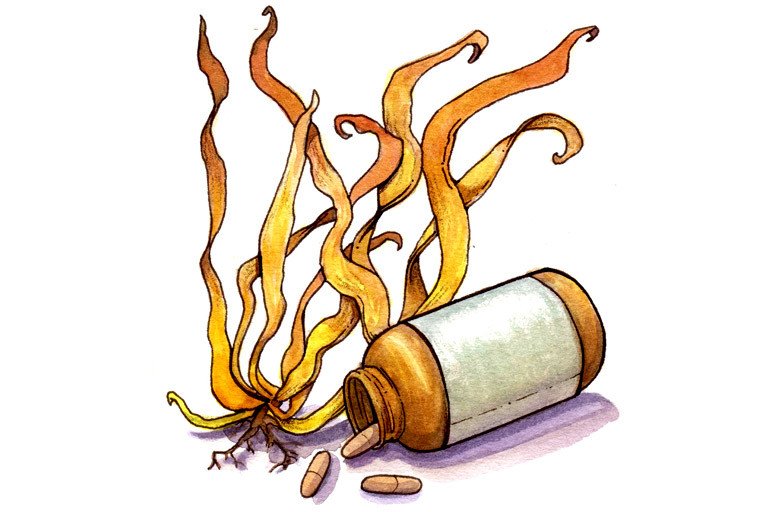
Common Names
- Sulfated alpha-L-fucan
- Fucoidin
- Fucan
- Mekabu fucoidan
For Patients & Caregivers
Tell your healthcare providers about any dietary supplements you’re taking, such as herbs, vitamins, minerals, and natural or home remedies. This will help them manage your care and keep you safe.
Fucoidan is a chemical found in many species of brown seaweed. It also comes as capsules, extracts, and powder.
Fucoidan is used to:
- Boost your immune system
- Lower inflammation (swelling)
- Prevent blood clots
- Reduce high blood pressure
It’s generally safe to use fucoidan in food. Talk with your healthcare providers before taking fucoidan supplements. Herbal supplements are stronger than the herbs you’d use in cooking. They can also interact with some medications and affect how they work. For more information, read the “What else do I need to know?” section below.
No major side effects have been reported.
Talk with your healthcare provider if you’re taking a blood thinner, such as warfarin (Coumadin® and Jantoven®). Fucoidan may increase your risk of bleeding.
For Healthcare Professionals
Fucoidan is a sulfated polysaccharide found in the cell walls of many species of brown seaweed. In vitro studies show that it has antitumor, antiangiogenic (2) (3) (4) (5) (6) (7), antiviral (15) (16), antiarthritic (18), and immunomodulatory (17) effects. Fucoidan also exhibited neuroprotective (11) (12), radioprotective (13), and antiulcer (14) properties.
In animal models, fucoidan exerts anti-inflammatory effects to protect against various organ injuries (19) (20) (21) and improved inflammatory pathology of acute colitis (22). Although a high molecular weight fucoidan did not improve outcomes in mice following intracerebral hemorrhage, it is suggested that low-molecular-weight fucoidans have increased therapeutic potential and should be evaluated for this purpose (23).
In humans, dietary fucoidan modulates platelet aggregation via anti-thrombotic effects (24). In overweight or obese adults, fucoidan over 3 months decreased diastolic blood pressure and LDL cholesterol, and increased insulin secretion (25). Fucoidan also decreased pro-viral load in a small group of patients with human T-lymphotropic virus type-1-associated neurological disease (26). Fucoisan consumption for one month prior to influenza vaccination may boost post-vaccination antibody production in immune-compromised elderly (27).
Preclinical data suggest that fucoidan can help relieve cyclophosphamide-induced intestinal mucosal injury by altering gut flora, resulting in reduced inflammation (30). Oral fucoidan in a small group of volunteers improved mobilization of hematopoietic progenitor stem cells with high levels of CXCR4 expression (28). In advanced cancer patients, fucoidan coadministration enabled patients to continue chemotherapy, regulated fatigue (29), and reduced levels of pro-inflammatory cytokines (31).
Because fucoidan demonstrates anticoagulant (8) (9) and antithrombotic (10) activities, it may have additive effects when taken with anticoagulants. In a small study of breast cancer patients, co-administration of fucoidan with either of two hormonal therapies, letrozole or tamoxifen, was well tolerated and did not result in any clinically significant interactions (35).
Several species of brown seaweed
- Immunostimulation
- Inflammation
- Prevent blood clots
- Hypertension
In vitro, a low-molecular-weight fucoidan inhibited human rheumatoid arthritis fibroblast synoviocytes and triggered apoptosis via decreased expression and secretion of MMP-1, -3, and -9, and suppression of NF-kB binding activity, p65 nuclear translocation, and IkappaB-alpha degradation (18). In animal models, fucoidan protected against liver injury via suppression of the inflammatory signaling pathway, inflammatory mediators, and inflammatory cell infiltration (20). It also reduced production of cyclooygenase-2 and NO, while increasing expression of the hepatoprotective enzyme hemeoxygenase-1 on murine liver and HepG2 cells (21). Fucoidan suppressed inflammation in an ultraviolet B-irradiated mouse model, decreasing thickness of the prickle cell layer and MMP-1 (19).
In humans, dietary fucoidan shortens lysis time of the thrombus by elevating prostacyclin secretion caused by increased H2O2 production in the blood (24). Various antitumor, antiviral and immune-modulating effects are attributed to NK cell stimulation, and downregulation of transcription factor AP-I and IGF-IR signaling (2) (3) (32). In melanoma cells, it increased lapatinib effects via ERBB3 inhibition (33). In human colorectal cells, it reduced tumor-promoting M2 macrophages and in combination with etoposide, prevented HCT116 tumorigenicity (34). Neuroprotective effects are attributed to suppression of TNF-alpha- and IFNγ-induced NO production in C6 glioma cells (11) and to antioxidative effects (12). Fucoidan inhibits metastasis by preventing adhesion of tumor cells to the extracellular matrix (4). It induced apoptosis of human T-cell leukemia virus type I that causes adult T-cell leukemia by inactivating NF-kB, which regulates antiapoptotic proteins (3). In a murine model, fucoidan suppressed angiogenesis induced by sarcoma 180 cells (5).
Diarrhea, which improved immediately after stopping fucoidan administration (26).
Anticoagulants such as warfarin and heparin: Due to its anti-thrombotic effects, fucoidan may increase bleeding risk (24).